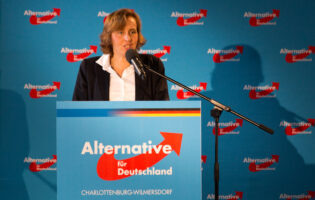
Maria Skóra, DAAD/AGI Research Fellow
AGI is pleased to welcome Maria Skóra as a DAAD/AGI Research Fellow in Fall 2024. Maria Skóra is an independent consultant and advisor affiliated with the Institut für Europäische Politik as …
Episode 112: Eastern State Elections and Their Implications for National Politics
In state elections in Thuringia and Saxony, the right-wing Alternative for Germany (AfD) surged to first and second place, respectively, with over 30 percent of the vote in both states. …

AGI Profiles: Alexander Gauland
Member of the Bundestag and Honorary Chairman of the AfD Dr. Alexander Gauland is the honorary chairman of the Alternative für Deutschland (AfD) and a member of the Bundestag. Together …

AGI Profiles: Beatrix von Storch
Member of the Bundestag and Deputy Leader of the Alternative for Germany Beatrix von Storch, born Beatrix Amelie Ehrengard Eilika, Duchess of Oldenburg, is the maternal granddaughter of Adolf Hitler’s …

Electoral Reform in Germany
An End to a Never-ending Story? On July 30, 2024, the Federal Constitutional Court of Germany ruled that the highly contested electoral reform passed in early 2023 was by and …
Recent Authors
AGI provides knowledge, insights, and networks as tools to solve the challenges ahead.
Support Our Work
AGI Profiles: Alice Weidel
Member of the Bundestag and Co-Chair of the AfD As Germany anticipates the September state-level elections in Brandenburg, Thuringia, and Saxony, the Alternative for Germany (Alternative für Deutschland, AfD) continues …

Should the AfD be Worried about the BSW?
The cracks in the Left Party’s foundations finally gave away when Sahra Wagenknecht, the party’s most recognizable and popular member, withdrew her membership in October 2023 amid widespread belief that …

AGI Profiles: Tino Chrupalla
Member of the Bundestag and Co-Chair of the Alternative for Germany Tino Chrupalla is the co-leader of the Alternative for Germany (AfD) with Alice Weidel, elected in 2021. Representing the …

AGI Profiles: Jörg Urban
Member of the Saxon State Parliament and Chair of AfD Saxony Born in 1964, Jörg Urban is the leader of the Alternative for Germany (AfD) in Saxony. A member of …
Episode 110: The Continued Strength of the AfD
The eastern German states of Saxony and Thuringia will vote in state elections on September 1, and Brandenburg will vote on September 22. The populist radical-right Alternative for Germany (Alternative …

AGI Profiles: Björn Höcke
Member of the Thuringian State Parliament and Chair of AfD Thuringia As Germany looks forward to important state-level elections in eastern Germany in fall 2024, one figure continues to draw …

AGI Profiles: Andreas Kalbitz
Member of the Brandenburg State Parliament Andreas Kalbitz is a member of the Brandenburg State Parliament and a former member of the Alternative für Deutschland (Alternative for Germany, AfD). He …



